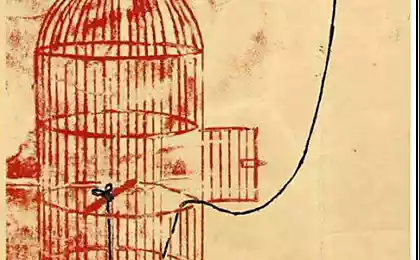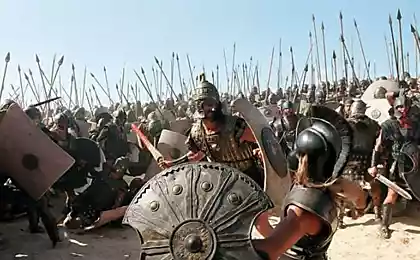182
5 political murders that shocked ancient Rome
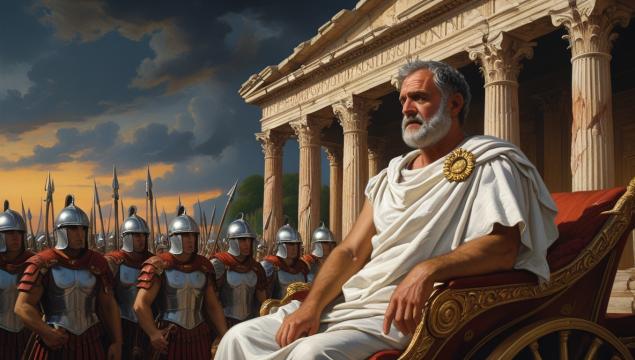
The Roman Forum - the center of political life and intrigues of the ancient world
Ancient Rome was a great place for the average person to live, especially if they had no political ambitions. For those who sought power, however, the Roman political arena was a deadly battleground. In the history of the Eternal City, political assassinations became so commonplace that they changed the course of civilization. These bloody events not only shocked contemporaries, but also laid the foundation for the most important political and social transformations of the ancient world.
1. The Assassination of Tiberius Gracchus (133 BC)
Tiberius Sempronius Gracchus, a popular tribune, was the first high-profile victim of political violence in late republican Rome. His reforms, aimed at redistributing land to impoverished peasants, provoked the fury of the senatorial aristocracy.
In the midst of a political crisis, when Tiberius ran for a second term as a tribunate (which was unprecedented), a group of senators led by Publius Scipio Nazika attacked him and his supporters. Armed with wreckage of benches and batons, they beat Tiberius to death during a popular gathering on Capitol Hill. His body, along with the bodies of more than 300 of his supporters, was dumped in the Tiber, refusing a traditional burial.
This murder not only shocked Roman society, but also set a dangerous precedent - political differences could now be resolved not by debate and voting, but by violence and murder. Many historians regard this event as the beginning of a period of civil strife that eventually led to the fall of the Republic.
2. The Assassination of Gaius Gracchus (121 BC)
Guy Gracchus, Tiberius' younger brother, continued his brother's political struggle. He assumed the position of the people’s tribune and introduced a series of even more radical reforms, including subsidizing bread for the urban poor, limiting the power of senators and expanding the rights of Italian allies.
When his term expired and his re-election attempt failed, the Senate declared a state of emergency, giving consul Lucius Opimius unlimited powers to "defend the republic." In the ensuing clash, some 3,000 Gracchus supporters were killed.
Realizing the hopelessness of the situation, Guy Gracchus ordered his slave to kill him. According to another version, he fled to the grove of Furina on the Yanikulsky hill, where he committed suicide. His head was cut off and, filled with lead, presented to the consul Opimius, who paid a reward for it in the amount of her weight in gold.
The murders of the Gracchus brothers showed that the Roman aristocracy was ready to use any means to preserve its privileges, even if it meant direct violence against elected officials of the republic.
3. The Assassination of Mark Tullius Cicero (43 BC)
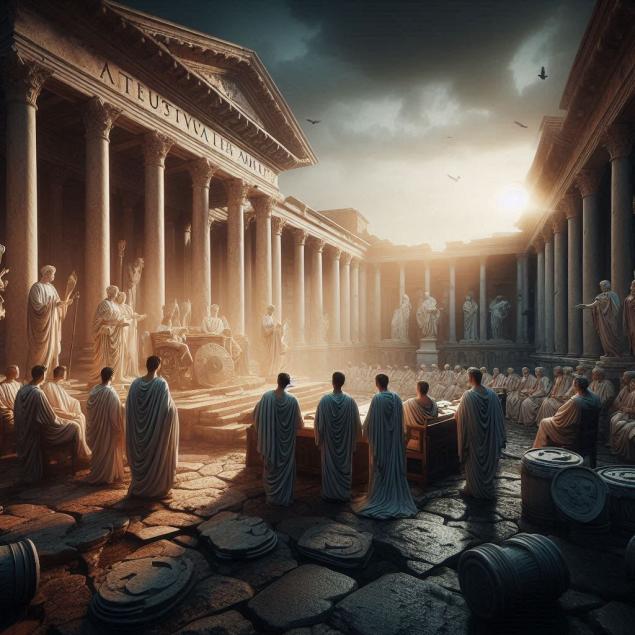
Marcus Tullius Cicero, the greatest orator and statesman of the late Roman Republic, fell victim to political scriptures after the formation of the Second Triumvirate (Octavian, Antony and Lepidus). His speeches against Mark Antony, known as the "Philippians," so angered Antony that he insisted on Cicero's inclusion on death rows.
On December 7, 43 BC, a group of assassins led by the centurion Gerennius and the military tribune Popilius overtook Cicero at his estate in Formia. According to Plutarch, Cicero looked out of the stretcher and calmly put his neck under the sword, meeting death with the dignity characteristic of the Roman Stoic. His severed head and hands were taken to Rome and displayed on the oratorical podium (Rostrakh) at the Forum - a cruel symbolism given that it was from there that his famous speeches sounded.
Antony ordered a pin to pierce Cicero's tongue, avenging the charges against him. Antony's wife, Fulvia, according to some accounts, mocked the speaker's severed head by piercing his tongue with golden studs.
4. The Assassination of Julius Caesar (44 BC)
Perhaps the most famous political assassination in the history of not only Rome, but the entire ancient world occurred in the Ides of March (March 15) 44 BC. The conspirators, including some 60 senators led by Marcus Junius Brutus and Gaius Cassius Longinus, stabbed Caesar 23 times in the Senate building at the foot of the Pompey statue.
Interesting facts about the assassination of Caesar
- Caesar received several warnings about the conspiracy, including the famous prophecy of the soothsayer Spurinna: "Beware of the Eid of March!"
- According to Suetonius, Caesar's last words to Brutus were, "You too, my child?" (Et tu, Brute?), although it is more likely that he uttered the Greek phrase, "Kα, σύ, τέκνον?" ("And you, my son?")
- Of the 23 wounds, only one inflicted on the chest was fatal, according to the medical report of doctor Antistius.
- After the assassination in Rome, unusual atmospheric phenomena were observed: the sun seemed dim all year, which was later interpreted as divine disapproval.
The assassination of Caesar, conceived as an act of liberating the republic from tyranny, paradoxically led to the final collapse of the republican system and the establishment of an empire under Octavian Augustus. This murder clearly demonstrates how political violence often leads to results opposite to those sought by its initiators.
5. The Assassination of Caligula (AD 41)
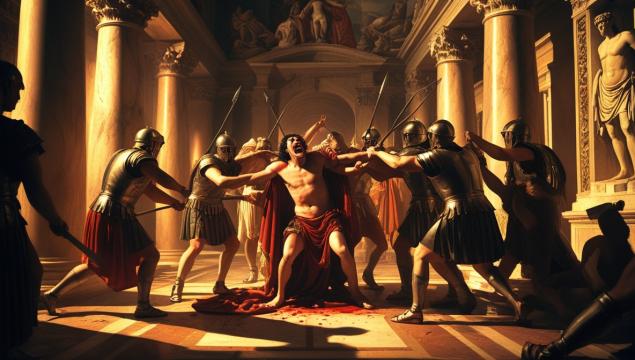
Assassination of Emperor Caligula by the Praetorian Guard
Gaius Julius Caesar Augustus Germanicus, known as Caligula, was assassinated three years and ten months after the beginning of his reign, which gradually turned into a brutal tyranny. The plot was led by the Prefect of the Praetorian Guard Cassius Herea and several senators.
On January 24, 41 CE, Caligula was returning from a theatrical performance through the palace's underground passageway. There he was attacked by the conspirators, inflicting more than 30 wounds. Herey struck first, after which the other conspirators joined the attack. According to the historian Suetonius, during the attack Caligula shouted that he was still alive, but the killers continued to strike until the emperor fell dead.
The assassination of Caligula and subsequent events revealed the growing role of the Praetorian Guard in the political life of Rome. It was the praetorians who enthroned Caligula's uncle, Claudius, demonstrating for the first time that emperors could be created by the army, not the Senate.
Historical Lessons from Roman Political Murder
Political assassinations in ancient Rome left a deep mark on world history and political philosophy. They demonstrate several important lessons that are relevant to modern society:
- Violence as a method of political struggle rarely leads to the desired results and often exacerbates existing problems.
- Assassination of a political leader usually does not eliminate the systemic causes of a crisis, but only changes its direction.
- Political violence tends to escalate, creating a vicious cycle of revenge and counter-revenge.
- A society that accepts political violence inevitably loses stability and moves toward authoritarianism.
- Behind the facade of the killers’ personal motives are often deeper socioeconomic contradictions.
Recommendations for modern political scientists and historians
Studying Roman political assassinations can offer valuable insights into political violence in the modern world:
- Analyze not only the immediate causes of political violence, but also the long-term structural factors contributing to it.
- Study the role of rhetoric and propaganda in legitimizing political violence
- Explore how society and political institutions adapt after political assassinations
- Pay attention to how political assassinations transform into collective memory and national myths.
- Compare ancient Roman cases with modern examples to identify historical patterns
Glossary of terms
The tribune was an elected official in ancient Rome who represented the interests of the plebeians. He had veto power over the decisions of magistrates and the Senate, and his personality was considered sacrosanctitas.
Proscription is the practice of publicly announcing lists of outlawed individuals whose property was subject to confiscation and whose murder was encouraged. This was especially true during the time of Sulla and the Second Triumvirate.
Philippiques - 14 denunciations of Cicero against Mark Antony, named after the speeches of Demosthenes against the Macedonian king Philip II.
Ides of March - in the Roman calendar, the 15th day of March (as well as May, July and October) or the 13th day of the remaining months. The Day of Julius Caesar's Assassination (March 15, 44 BC)
The Praetorian Guard was an elite military unit that served as the personal guard of the Roman emperors. Over time, it became a powerful political force capable of enthroning and overthrowing emperors.
Rostras is an oratorical tribune on the Roman Forum, decorated with the noses (rostras) of enemy ships captured in naval battles.
Stoicism is a philosophical trend that taught dispassionately to accept all life circumstances, including death, as a manifestation of the cosmic order.

